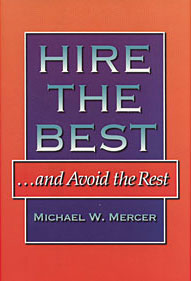
|
Pre-employment personality tests are among the different methods many companies use to hire hard-working and productive employees into their workforces. Make plans to join Dr. Michael Mercer, author of the book “Hire the Best & Avoid the Rest,” for his educational seminar at NetworkASA 2013 on October 2-4 in Washington, D.C.
Two pre-employment tests help you assess applicants’ work ethics
Two types of pre-hire personality tests that help predict if an applicant may become a hard-working employee are behavior tests and dependability tests.
Using the pre-employment behavior test, start by benchmarking your best employees who display terrific work ethics. Do this for each job. To benchmark, have your best employees take the test. Their scores become your company’s “benchmark” test scores for each job. When applicants take the pre-employment personality test, you can (A) prefer applicants getting the same test scores as your best employees and (B) decrease considering applicants whose scores significantly differ from your best employees’ benchmark scores.
Doing pre-employment personality test benchmarking is good for skilled, professional and management jobs. Use a dependability pre-employment test for lower-level, unskilled and semiskilled jobs.
Warning: Do not use benchmarks based on “national norm.” For instance, the pre-employment personality test’s “national norm” for a particular job most likely differs from your company’s customized benchmark for that same job.
A dependability pre-employment test includes a scale measuring work ethic. You will get a score that shows you the applicant has a lousy or moderate or strong work ethic. You will consider a person with a lousy work ethic high-risk. An applicant with a strong work ethic is low-risk – someone you may decide to hire.
Other methods to assess work ethic
Look at work history. Does the applicant have a career showing increasing responsibilities?
In interviews, see if the applicant acts enthused for doing the job and not solely getting a paycheck. Ask the applicant for measurable results achieved, plus names of bosses who can verify each result.
Also, ask this artfully vague question, “After you finish your work, what do you do?” A strong work ethic person’s answer will include asking for more work or offering to help co-workers. A lazy bum will interpret the question differently and talk about non-work activities.
Hire people with terrific work ethics. Do not try to change lazy bums
I’ve heard about two books relevant to work ethic, entitled “Reviving Work Ethic” and “The Power of Habit.”
I recommend the following to help increase your company’s productivity and profits. First, do not waste time “reviving the work ethic” of a lazy employee. It proves immensely more profitable to (1) de-employ lazy bums rather than “reviving” slackers, and (2) hire replacements who have a good work ethic that never needs “reviving.” Second, work ethic is a habit. Make sure you hire people who possess the “habit” of having a powerful work ethic.
Use pre-hire personality tests to spot applicants with good work ethics
Invest your time and resources in absolutely fabulous employees who have terrific work ethics. They show up every day, work hard and increase your company’s productivity and profits. Avoid hiring or retaining lazy bums who act entitled and want a paycheck without working for it.
Pre-employment personality tests – behavior and dependability pre-hire tests – help you identify which applicants have lousy, moderate or strong work ethics. Use pre-employment tests and other methods to hire applicants possessing good work ethics.

|
| Dr. Michael Mercer |
Learn more by attending Dr. Mercer’s Hire the Best & Avoid the Rest educational seminar on Oct. 2 at NetworkASA 2013 in Washington, D.C. Visit www.asa.net for more information and to register.
What is a terrific work ethic?
A person with a good work ethic:
- Shows up on-time everyday
- Puts in day’s work and more everyday
- Is conscientious
- Is industrious
- Completes assignments
- Asks for more work after finishing assignments; and
- Increases your company’s 2Ps: Productivity & Profits.
What is a person with a lousy work ethic?
An employee with awful work ethic:
- Is a lazy bum, a “slacker”
- Does not show up
- Calls in “sick” although not sick
- Uses all “sick days”
- Avoids doing work
- Goofs up work and does not care
- Acts “entitled”
- Complains a lot
- Uses cell phone when the boss is not looking; and
- Decreases your company’s 2Ps: Productivity & Profits.




